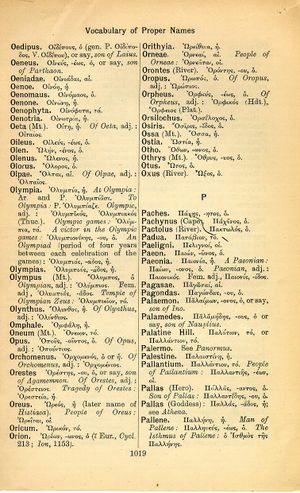Pallas
αἰθὴρ δ᾽ ἐλαφραῖς πτερύγων ῥιπαῖς ὑποσυρίζει (Aeschylus, Prometheus Bound 126) → The bright air fanned | whistles and shrills with rapid beat of wings.
English > Greek (Woodhouse)
(Hero) Πάλλας, -αντος, ὁ.
Son of Pallas: Παλλαντίδης, -ου, ὁ.
(Goddess) Παλλάς, -άδος, ἡ; see Athena.
Latin > English (Lewis & Short)
Pallăs: ădis and ădos, f., = Παλλάς.
A Surname of the Greek goddess Athene, and hence of the corresponding Minerva of the Romans, the goddess of war and wisdom; the inventress of working in wool, and of the cultivation of the olive, on which account the olive-tree was sacred to her: Pallas Minerva est dicta, quod Pallantem Gigantem interfecerit, vel, sicut putabant, quod in Pallante palude nata est, Fest. p. 220 Müll.: Pallas . . . Proeliis audax, Hor. C. 1, 12, 20; Ov. M. 5, 263: Palladis ales, the owl, Ov. F. 2, 89: Pallados arbor, the olive-tree, id. A. A. 2, 518; cf.: rami Palladis, Verg. A. 7, 154: iratā Pallade, i. q. invitā Minervā, Ov. F. 3, 826.—
B Transf.
1 Oil: infusā Pallade, Ov. Tr. 4, 5, 4: pinguis, id. H. 19, 44.—
2 The olive-tree: dat quoque baciferam Pallada rarus ager, Ov. Am. 2, 16, 8.—
3 The Palladium: Helenum raptā cum Pallade captum, Ov. M. 13, 99: Pallade conspectā, id. Tr. 2, 293.—
4 The number seven, Macr. Somn. Scip. 1, 6; Mart. Cap. 7, § 738.—
5 For Vesta, because the Palladium stood in the temple of Vesta: Pallados ignes, Prop 4 (5), 4, 45.—
II Deriv.
A Pallădĭus, a, um, adj., = Παλλάδιος, of or belonging to Pallas, Palladian: numen Palladium, i. e. Pallas, Ov. Tr. 1, 10, 12: aegis, of Pallas, Luc. 7, 570: Palladiā gaudent silvā vivacis olivae, Verg. G. 2, 181; latices, oil, Ov. M. 8, 275: corona, an olive-wreath, id. A. A. 1, 727: arx, Troy, Prop. 3, 7 (4, 8), 42: arces, Athens, Ov. M. 7, 399: honores, shown to Pallas, id. H. 17, 133: pinus, the Argo, because built under Minerva's direction, Val. Fl. 1, 475: metus, inspired by Pallas, id. 6, 408: forum, the Roman forum, because there stood a temple of Minerva, Mart. 1, 3, 8: Palladia Alba, because Domitian caused the Quinquatria in honor of Pallas to be annually celebrated there, id. 5, 1, 1; cf. Suet. Dom. 4: Palladia Tolosa, because the sciences flourished there, Mart. 9, 100, 3: manus, i. e. skilful, Stat. S. 1, 1, 5: ars, Mart. 6, 13, 2: lotos, the flute, id. 8, 51, 14.—
B Subst.: Pallădĭum, ii, n., the image or statue of Pallas, which, in the reign of Ilus, fell from heaven at Troy, and during the Trojan war was carried off by Ulysses and Diomed, because the fate of the city depended on the possession of this image. It afterwards came from Greece to Rome, where Metellus saved it from the temple of Vesta when the latter was burned down, Verg. A. 2, 166; Sil. 9, 531; Ov. Tr. 3, 1, 29; Serv. ad Verg. A. 2, 227; Cic. Phil. 11, 10, 24; id. Scaur. 2, 48; Plin. 7, 43, 45, § 141; cf. Plaut. Ps. 4, 6, 1 sq.; id. Bacch. 4, 9, 31.
Pallas: antis (voc. Pallā, Verg. A. 10, 411 al.; also Pallas and Pallan, acc. to Prisc. p. 702), m., = Πάλλας,
I the name of several mythic and historical personages.
A Son of Pandion, the father of the fifth Minerva, Cic. N. D. 3, 23, 59; Ov. M. 7, 500.—
B A king of Arcadia, the great-grandfather of Evander, Verg. A. 8, 54 Serv.—
C Son of Evander, Verg. A. 8, 104.—
D One of the giants, Claud. Gigant. 94; Fest. s. v Pallas, p. 220.—
E A freedman of the emperor Claudius, proverbial for his wealth; slain by Nero, Plin. Ep. 7, 29; 8, 6; Tac. A. 12, 53; Juv. 1, 109; Plin. 33, 10, 47, § 134.—
II Derivv.
A Pallantēus, a, um, adj., of or belonging to Pallas (the ancestor of Evander), Pallantian: moenia Pallantea, i. e. of the city of Pallanteum, in Italy (v. in the foll.), Verg. A. 9, 196 and 241: apex, of the Palatine, Claud. VI. Cons. Honor. 644. —
2 Subst.: Pallantēum, i, n.
a A city in Arcadia, the residence of Pallas, Liv. 1, 5 init.; Just. 43, 1.—
b The city founded by Evander in Italy, on the site where Rome afterwards stood, Verg. A. 8, 54; 341.—
B Pallantĭăs, ădis, f., Aurora, so called because descended from Hyperion, the uncle of the giant Pallas, Ov. F. 4, 373; id. M. 9, 420.—
C Pallantis, ĭdos and ĭdis, f., Aurora (v. Pallantias, supra), Ov. M 15, 700.—Transf., the day, Ov. F. 6, 567.—
D Pallantĭus, a, um, adj., of or belonging to Pallas, Pallantian: Pallantius heros, i. e. Evander, Ov. F. 5, 647.
Latin > French (Gaffiot 2016)
(1) Pallăs,¹⁰ ădis et ădos, f. (Παλλάς),
1 Pallas ou Minerve : Hor. O. 1, 12, 10 ; Virg. En. 7, 154 ; Ov. M. 5, 263 ; Palladis arbor Ov. Ars 2, 518, l’olivier ; Palladis ales Ov. F. 2, 89, la chouette ; irata Pallade Ov. F. 3, 823, malgré Minerve
2 c. Palladium : Ov. M. 13, 99

